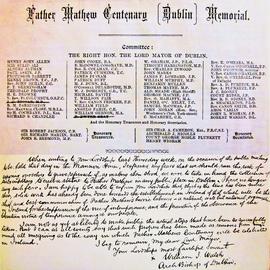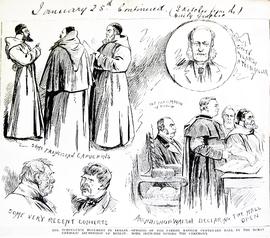Minute Book of the Father Mathew Centenary Committee
- IE CA FM RES/3/1/6
- File
- Oct. 1889-May 1893
Part of Irish Capuchin Archives
Minute book of the Father Mathew Centenary Committee which had the responsibility for financing and erecting the statue of the Apostle of Temperance on Sackville (later O’Connell Street), Dublin. The Centenary Committee was made up of Catholics, Anglicans and other Protestant denominations and notably received the support of the Most Rev. William Plunket, Baron Plunket, the Church of Ireland Archbishop of Dublin: ‘Most thoroughly do I sympathize in any movement for honouring the memory of one to whom the cause of temperance in this land is so largely indebted’. (10 Oct. 1889).
Prominent public (non-clerical) figures in the committee included:
George Noble Plunkett (1851-1948) an Irish nationalist and father of Joseph Plunkett, one of the executed leaders of the 1916 Rising.
John Redmond MP (1856-1918), an Irish home rule nationalist, later leader of the Irish Parliamentary Party.
Michael Davitt (1846-1906), a nationalist and agrarian campaigner.
Thomas Sexton MP (1848-1932), Lord Mayor of Dublin.
William Martin Murphy MP (1844-1919), a businessman and politician.
Timothy Charles Harrington MP (1851-1910), a member of the Irish Parliamentary Party.
The minute book reveals that from the outset committee members were in support of resolutions which would place the statue in a prominent public place in the city. For instance, Thomas Connolly suggested that a ‘statue should be erected similar to the O’Connell [monument], and that it should be placed at the other end of O’Connell Street so that people might be reminded by the two monuments of the two great men who were in a sense the complement of one another …’. (Oct. 1889).
• This intent was formalised in a resolution forwarded by the Committee to Dublin Corporation on 1 May 1890 ‘requesting them to grant a site in Upper O’Connell Street, Dublin, for the erection of the Memorial Statue to Father Theobald Mathew’. (1 May 1889).
• The aim of the Centenary Committee was from the beginning to site the statue in the most prominent space available in the city linking the historically concurrent campaigns undertaken by Fr. Mathew (temperance) and O’Connell (emancipation and repeal). It should also be noted that the Corporation was unanimous in granting the O’Connell Street site. (15 May 1890).
• An application was made to the boundary surveyor to obtain ‘the consent of the Corporation for a 16 feet square space on the site known as the “Retreat” in Upper O’Connell Street which has been already allotted to the Committee for the erection of the Father Mathew Centenary Memorial’. (5 June 1890).
The siting of an Fr. Mathew Statue on the main thoroughfare (St. Patrick’s Street) running through Cork city in 1864 influenced the Dublin Committee: Henry Brown reminded the Committee that the ‘citizens of Cork had already placed Father Mathew’s Statue in their city, where he remembered standing on the platform in Patrick’s Street, while the Mayor of Cork, John Francis Maguire MP was unveiling Foley’s exquisite statue’. (Oct. 1889). By October 1892 a total of £1,114 5s 3d had been collected by the Centenary Committee (13 Oct. 1892). The minute book includes subscription lists, accounts and pasted-in newspaper clippings re meetings of the committee and its efforts to raise funds for the memorial. Funding was sourced from various local temperance societies (both Protestant and Catholic), workingmen’s clubs, national schools and colleges, and public and professional bodies (corporations and the police force). Donations were received from across Ireland and from Irish emigrant communities in America, Canada, Australia and elsewhere.
The resolutions adopted at the official unveiling of the statue on 8 February 1893 reflected the widespread appeal of the Fr. Mathew commemoration and the ‘placing of a statue among the public monuments of the metropolis’:
• ‘That as the Rev. Theobald Mathew loved his countrymen of all creeds and laboured zealously for their moral improvement and temporal prosperity, this great meeting rejoices that this public monument to his memory has been erected to remind our people of what he accomplished in the cause of total abstinence’.
• ‘That the Centenary Statue of the Rev. Theobald Mathew having been erected by subscriptions from men of all parties, and regardless of religious distinctions, it is appropriate that it be now unveiled by the Right Hon. James Shanks as Lord Mayor of the City of Dublin’. (2 Feb. 1893).
Reference is also made in the Centenary Committee minute book to the very novel nature of the award of the commission to a female sculptor. Count Plunkett, a leading member of the Committee, referred to ‘the merit which characterizes the design of Miss Redmond, a young artist who had made her mark, not only in this country but on the continent, in spite of her youth’. (1 May 1890).


